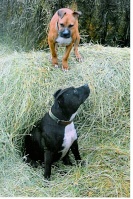Bluffside
Adult Pitbull


Number of posts : 220
Age : 52
Localisation : Cahokia,Illinois
Registration date : 2006-11-10
 |  Subject: Coccidia Subject: Coccidia  Mon Jan 29, 2007 3:51 am Mon Jan 29, 2007 3:51 am | |
| Coccidia are a group of protozoan parasites that are extremely common and which infect a wide number of animal species, including dogs, cats, horses, cattle, goats, sheep and chickens --- and many other species of animals, as well. The groups of coccidians that infect pets include Eimeria, Isospora, Hammondia, Toxoplasma and Neospora. Of these, the two that areusually referred to as "coccidia" infections are Eimeria and Isospora infections and the rest are generally identified by name, as they are more complex parasites and cause specific disease problems. Eimeria species are more commonly involved in infections in cattle, sheep, horses,etc. and Isospora species are most commonly involved in infection in dogs and cats. So for the
purpose of the rest of this note, the enteric (gastrointestinal) forms of Isospora are what will be covered.
The first thing that has to be considered is that coccidosis is very common. It is likely that 30 to 50% of puppies have coccidia in their stools at some time during their first few months of life. These may be coccidia from another species that the puppy or kitten has in the digestive tract due to ingestion of stool, such as rabbit feces, squirrel feces or cat feces (in the case of puppies). If this is the case it is unlikely that the puppy or kitten will actually have any clinical disease as a result of ingesting the coccidia. In other cases, a puppy or kitten becomes infected with coccidiosis, produces lots of oocysts of coccidia but never has clinical signs of disease such as diarrhea, loss of appetite, vomiting or failure to thrive. These pets may never show any clinical signs and without signs it is questionable whether they should be treated or not, although I think that almost all veterinary practitioners go ahead and treat for the infection. Isospora species can also be transmitted through ingestion of intermediate hosts, such as infected mice.
Isospora species that affect dogs include Isospora canis, I. ohioensis, I. neorivolta and I. burrowsi. The species that affect cats include Isospora felis and Isospora rivolta. These coccidia tend to be pretty species specific, so infection of a puppy or kitten is not thought to be a risk to humans and puppies are not a risk to cats or infected kittens a risk to dogs. It is very likely that if one puppy in a litter has coccidiosis that all puppies are affected. It is extremely difficult to prevent coccidia infections, especially in group situations, so puppies coming from a breeder with coccidia is not an indication of poor sanitation or poor health care practices. It is
simply a very common problem.
Coccidia spread when oocysts are shed in the stool of infected pets and then the oocysts are consumed later by another susceptible dog or cat. Since incredible numbers of oocysts are shed from infected pets, the environmental contamination with coccidia oocysts is severe. Puppies and kittens often show signs of illness, usually watery diarrhea, before there are oocysts in their stools, so it sometimes takes several fecal samples to know if a puppy or kitten is infected. In addition, lots of dogs, cats, puppies and kittens are infected and are shedding oocysts despite having no clinical signs of infection.
Coccidia are easy to find using standard fecal floatation methods for fecal exams and are often present in sufficient numbers to show up if a small amount of stool is smeared on a glass slide, mixed with a small amount of saline and examined.
When Isospora species cause disease the most common form is watery diarrhea that is very profuse. Many kittens and puppies seem to just leak watery stools as if they have no control at all over their bowel movements, while others have a more "normal" diarrhea. Without treatment, the diarrhea might last for several weeks. With treatment the diarrhea might last several weeks, too --- but it does seem to cut down some on the duration of the diarrhea to treat affected puppies and kittens. The most commonly used medications are sulfonamide antiseptics, such as sulfadimethoxine (Albon Rx, Bactrovet Rx) given at 55mg/kg of body weight initially and then 27.5mg/kg per day for 4 to 7 days. The medication should be given until two days after symptoms of illness have disappeared. Lots of vets substitute trimethoprim/sulfa combination
medications (Ditrim Rx, Tribrissen Rx, Bactrim RX) for this sulfadimethoxine, using a dosage of 15mg/lb of the combined product and this seems to work, too. While it is probably impossible to kill all the coccidia in a puppy with clinical disease using medications, it may help reduce the numbers of organisms that littermates and housemates are subjected to and to shorten the duration of clinical signs.
In some cases it does seem like there is resistance to the sulfanomides. I am not sure if this is actually the case, since it is difficult to tell if the medication is working in the first place. However, if this is suspected, alternative medications include ampolium (Corid Rx) and furozolidin (Furoxone Rx).
General cleanliness does not ensure that infections will not occur, but removal of contaminated stool reduces the potential for infection. The oocysts are supposed to be pretty resistant to most disinfectants and things like steam cleaning or flame guns may be necessary to actually kill the oocysts, which is impractical for most situations. Keeping access to mice down (especially for cats) is also a good idea.
So the direct answers to your questions are that most of the time all littermates are infected. It is not likely that other species will be affected. The organism is spread in the stool, so keeping non-infected pets away from the stool of infected pets is helpful but if they share a commonenvironment it is highly likely that infection will occur. The infection may or may not cause clinical disease and treatment is generally considered to be necessary only for pets showing clinical signs.
I hope this information is helpful. | |
|
Mikado&Chalice
Top Pit


Number of posts : 618
Age : 56
Registration date : 2006-11-30
 |  Subject: Re: Coccidia Subject: Re: Coccidia  Mon Jan 29, 2007 5:56 am Mon Jan 29, 2007 5:56 am | |
| Good post. Very informative. Thank you for the info. | |
|
ericschevy
Top Pit


Number of posts : 748
Age : 45
Localisation : MI.
Registration date : 2006-12-05
 |  Subject: Re: Coccidia Subject: Re: Coccidia  Mon Jan 29, 2007 6:15 am Mon Jan 29, 2007 6:15 am | |
| Dang, Rocky had it when I got him, But I didn't know there was that much to it...Good Post... | |
|
redsky
Guest
 |  Subject: Re: Coccidia Subject: Re: Coccidia  Mon Jan 29, 2007 7:11 am Mon Jan 29, 2007 7:11 am | |
| Yep it can surely kill your dog! I believe Chelle posted some stuff on it in health section to. |
|
